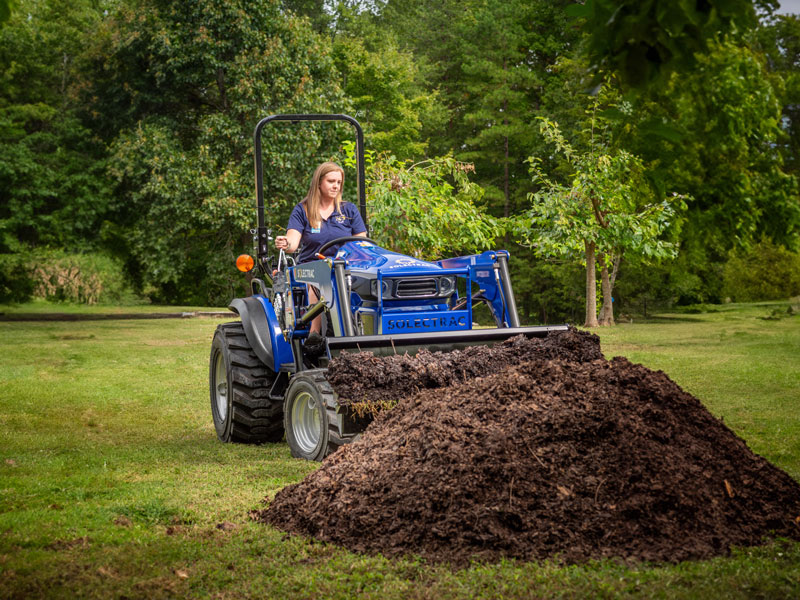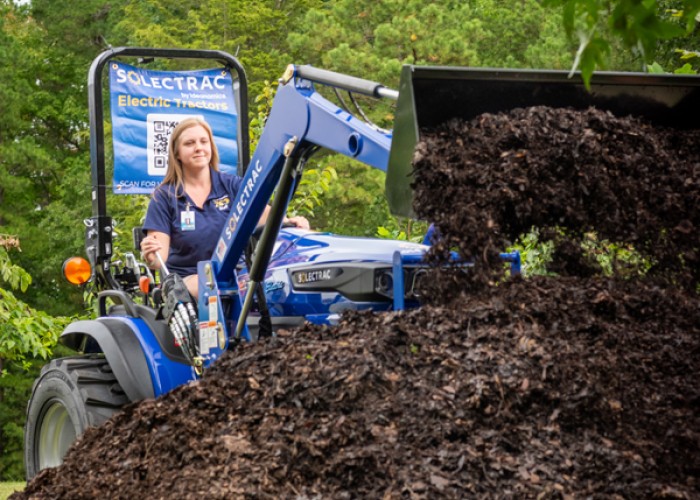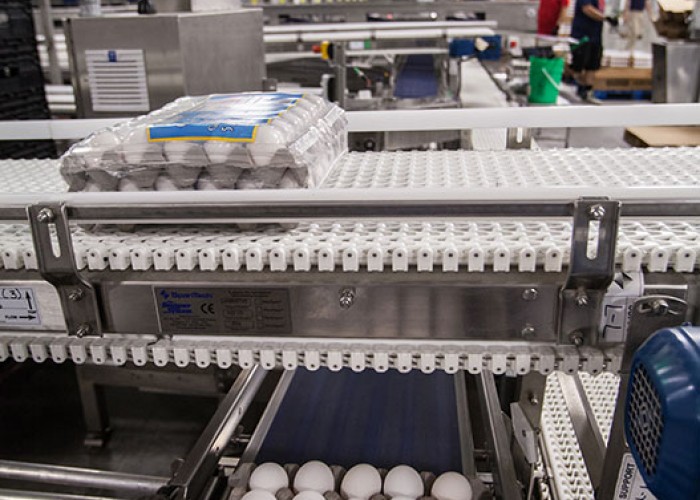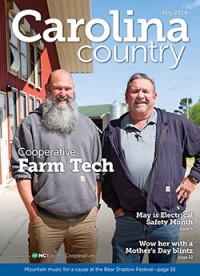The Farm of the Future
New farm tech is improving efficiency, reducing costs
By Scott GatesWhite Rock Farms is an idyllic livestock farm among the rolling hills of Anson County, which hogs, chickens and Jersey dairy cows call home.
The farm, served by Wadesboro-based Pee Dee Electric, partnered with its co-op and North Carolina’s Electric Cooperatives in 2021 to convert a pumping system from a diesel engine to a large single-phase electric motor — saving money for the farm and reducing local carbon emissions.
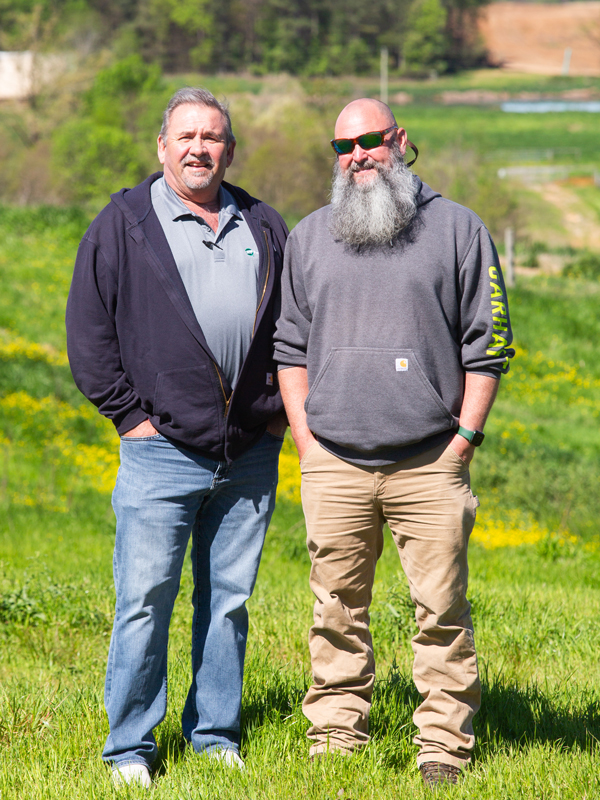
Pee Dee Electric Energy Use Advisor Todd Moore (left) with White Rock Farms owner Roddy Purser. Photo by Mollie Tobias Photography.
“Electric cooperatives are focused on finding technical solutions to help improve our farmers’ bottom lines and increase operational efficiency, which in many cases electric equipment can do,” says Jim Musilek, vice president of Innovation & Business Development for North Carolina’s Electric Cooperatives. “Agriculture is our state’s leading industry, and farming is in co-ops’ DNA. It’s where we came from and who we are. This type of technology supports the cooperatives’ Brighter Future initiative, leveraging beneficial electrification across rural North Carolina.”
Current applications at North Carolina farms include single-phase electric pumping systems, such as what was deployed at White Rock Farms, drones, electric tractors, hydroponic compact container farming, and electric irrigation systems.
Although larger agricultural equipment, such as tractors and combines, have traditionally been difficult to replace with electric alternatives due to weight, manufacturers are developing small-horsepower tractors that are more compact, lower in weight and feature battery-powered options.
“In certain applications, electric tractors have many benefits over their diesel counterparts,” Jim explains. “In situations where frequent idling is necessary or indoor spaces where emissions are an issue, electric tractors have the advantage.”
The North Carolina Zoo recently partnered with Asheboro-based Randolph EMC to add an all-electric tractor to its fleet. The zoo is already saving on diesel and maintenance costs, and new uses for the tractor are being assessed to determine where else the technology could be deployed.
Agriculture is our state’s leading industry, and farming is in co-ops’ DNA. It’s where we came from and who we are. This type of technology supports the cooperatives’ Brighter Future initiative, leveraging beneficial electrification across rural North Carolina.
“Electric drive trains are radically simpler than diesel tractors, making maintenance cheaper and easier,” says Jennah Denney, electric vehicle strategy & solutions manager at the National Rural Electric Cooperative Association (NRECA). “Electricity flowing through batteries and electric motors is more efficient than diesel being delivered to farms, moved into tanks and burned in diesel engines. As battery technology continues to advance, further improvements in electric farming equipment are expected.”
This efficiency leads to reduced energy consumption and lower operating costs for farmers. Additionally, the quieter operation of electric equipment minimizes disruptions to nearby communities, livestock and wildlife, making it ideal for residential areas or sensitive environments.
White Rock Farms’ electrification project was funded in part by a $25,000 grant from the Beneficial Electrification League, which Pee Dee Electric assisted in obtaining, and was driven by a desire for lower maintenance, the elimination of the need to refuel during extended use and a reduction in emissions. The system’s single-phase motor is used to manage animal waste and for irrigation.
“If you live in an area served by a single-phase distribution system and you need a big motor, you have limited options: Bring in three-phase power, which can be cost prohibitive, use a phase converter or bring in a diesel engine to do the work,” Jim says. “This new option — using a large-horsepower single-phase electric motor — is a game changer.”
“The farm’s location, which only has single-phase electric service, made the pump an excellent addition — the strategic move is expected to enhance the farm’s operational efficiency and sustainability,” says Pee Dee Electric Energy Use Advisor Todd Moore. “Pee Dee Electric is thrilled to collaborate on this endeavor, driving beneficial electrification forward. Together, we’re laying the groundwork for a more sustainable and efficient future in agriculture.”
Jennah recommends that farmers who are considering electrified equipment evaluate their specific needs, including power requirements and operational tasks.
“Farmers should work with their local electric cooperative to assess the farm’s power supply capacity to ensure it can handle the additional load without causing issues,” she explains. “By conducting a thorough analysis of their unique needs and goals, farmers can determine if adopting electrified agricultural equipment is a suitable and advantageous option.”
The Future of Electrified Ag
Here are a few ways the electrification trend is gaining momentum on the farm.

1 Electric tractors show promise for increased efficiency and reduced maintenance.
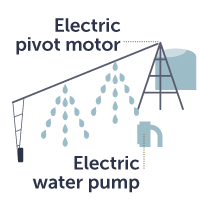
2 Electric motors for irrigation are more efficient than diesel motors and result in greater cost savings for farmers.

3 Drones equipped with electric agricultural technology make them a valuable tool for optimizing crop health, detecting pests and enhancing irrigation practices.
Considering electrification?
If you’re interested in electrification opportunities for your farm, the North Carolina Beneficial Electrification for Agriculture grant program is focused on irrigation pumping plant conversions on farms located in electric co-op service areas, available now through September 30, 2025. The program is funded through a grant from the U.S. Department of Agriculture and operated by a division of North Carolina’s Electric Cooperatives and EnSave, Inc. Contact Margi Lee at margaretl@ensave.com or 802-434-1826 to learn more.
-
Explore more brighter futures
-
Share this story:


